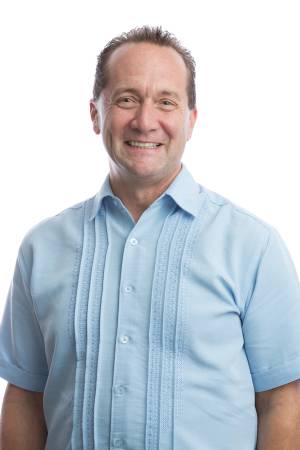Painter Publishes Study Fact-Checking “The Big Lie”
June 23, 2022
By Stephanie Rizzo ’09
Communication professor David Painter looks at whether exposure to fact-checking has the power to sway those who believe false information about current events.

Communication professor David Painter has a new study out that examines “The Big Lie,” i.e. the false yet pervasive idea that the 2020 election was plagued by systemic fraud. The study was a joint project between Painter and University of Florida professor Juliana Fernandez and included more than 300 Rollins students, faculty, and staff in its sample size.
The study looks at whether exposure to fact-checking has the power to sway those who believe false information about current events, specifically as it relates to current U.S. politics.
Fernandez and Painter first polled participants to gather a sense of their demographic and political-party affiliation. Then participants answered a series of questions from the Cognitive Reflexivity Test, which measures the use of critical versus intuitive thinking. Finally, participants were randomly assigned to either: (1) a treatment condition where they read the Associated Press’ election-fraud fact-checking article from; or (2) a control condition with an article about birdwatching from Birdwatcher’s Digest as a placebo.
After exposure to the stimuli, participants completed a post-test questionnaire that included measures of the election’s legitimacy and characterizations of the Capitol Hill attack on January 6.
Fernandez and Painter concluded that exposure to fact-checking information, critical thinking skills, and affiliation with the Democratic Party were positively related to participants’ beliefs in the election’s legitimacy and characterization of the Capitol Hill attacks as violent and extreme. Further, their findings suggest Republican and pro-Trump participants who rely on intuitive (versus critical) thinking are more likely to believe false claims of election fraud and may find violence an acceptable means of achieving their goals.
“As a communication professor, political communication scholar, and fake-news expert, this project allowed me to explore how people’s critical thinking influences their political beliefs, especially when they believe lies in the face of overwhelming contradictory evidence,” says Painter. “My job at Rollins is to foster my students critical thinking skills, and this study suggests that those skills translate into more accurate beliefs about our world and the rejection of political violence.”
Read More
April 24, 2024
Al Haddad and Diaz ’24 Present Research at Business Conference
Business professor Serina Al Haddad and Daniela Victoria Otelo Diaz ’24 recently presented research on luxury fashion conglomerate LVMH’s pandemic challenges at the Southeast Decision Sciences Institute (SEDSI).
April 23, 2024
Fox Day 2024 in Photos
Fox Day was once again everyone’s favorite day of the year. Look back at 2024’s unforgettable festivities and the moments that made this year’s celebration a true testament to Rollins’ most beloved tradition.
April 22, 2024
Adkins ’81 Inducted into Georgia Tech’s Engineering Hall of Fame
Rodney Adkins ’81 has been inducted into Georgia Tech’s engineering alumni hall of fame, which honors those who have achieved major engineering milestones in their professional careers.
